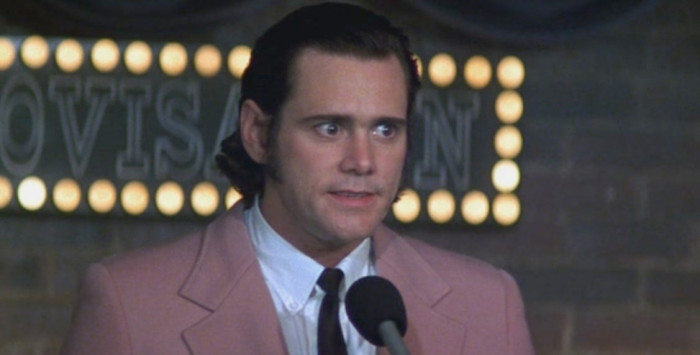'Jim And Andy: The Great Beyond' Review: A Revelatory Treasure Trove Of Comedic Brilliance [TIFF]
"When did this movie start?" asks a modern-day Jim Carrey to director Chris Smith. It's the start of what we know as Jim and Andy: The Great Beyond – With a Very Special, Contractually Obligated Mention of Tony Clifton. It's also probably one of the more normal things Carrey says or does throughout the documentary, a work presenting unreleased footage shot by Carrey behind the scenes of his Andy Kaufman biopic Man on the Moon.
Read our Jim and Andy: The Great Beyond review from TIFF below.
Rather than do standard promotion for the film in 1999, Carrey convinced Universal Pictures to give him a camera to film his own version of an electronic press kit. In the actor's mind, a traditional media tour just did not make sense for a movie about a comedian as iconoclastic as Kaufman – especially because his claim to fame was breaking through the stuffiness and self-seriousness of television in the early 1970s. Of course, bored celebrities with smartphones and lots of free time on movie sets now make the type of footage seen here a little commonplace. Similar material is never farther than an Instagram story away these days.
But this is Jim Carrey, after all. The footage is a treasure trove of comedic brilliance and revelatory insights into the process of a performer whose comedy is something like a "fugue state," as he puts it. As a method actor to assume the persona of Andy Kaufman, Carrey puts Daniel Day-Lewis to shame by terrorizing his esteemed Oscar-winning director Milos Forman. Especially once he gets into the anarchic character of Tony Clifton, an abrasive farcical take on a vintage club performer, the guardrails of his artistic discipline really start to disappear.
While not all the consequences of Carrey's exploration were positive for everyone around him, the process became a necessary one to fully understand the depths of Kaufman's craft. In the '70s, Kaufman consistently upended expectations because he was willing to offend and disturb. Post-Michael Richards meltdown video, there's a reticence for comedians to test their audiences in such a way. A joke taken out of context or poorly received now has the power to end a career.
Even by the end of the '90s, Universal worried about Carrey taking Kaufman's approach a little too seriously. To these corporate executives, Carrey was more than just an artist or a performer – he was a star. People have to like stars and want to identify with them. Kaufman relied on alienation as a key facet of his routine, drawing people in by first pushing them away. In an even more corporate environment, the people holding the purse decided the public should not see Carrey in such a light. With millions of dollars tied up in the success of Man on the Moon, they decided to lock his footage away in their equivalent of the Disney vault "so people don't think you're an a**hole," as Carrey recounts their decision.
Thanks to the magic of time and the countenance of producer Spike Jonze, the tapes finally see the light of day in Jim and Andy, which might have been for the best. Now unyoked from any burden of needing to put butts in seats, Carrey's filmed hijinks are now free to serve as a window into the mindset of his boundary-defying performance style. Smith intercuts and overlays a contemporary interview with Carrey, which adds nearly two decades of perspective to the material. It also provides a good deal of insight into what the actor has been up to in recent years.
Since Carrey gradually backed out of the harshest glare of the public eye roughly a decade ago, he underwent a substantial shift of worldview and philosophy that Smith probes in their sit-down. It's important to understand and take this into account given that Carrey claims his work directly correlates to the deepest questions of his soul when taking a part. Yet Smith could do a better job reigning in some of the more outlandish observations and keeping the focus tightly fixated on playing Kaufman.
When Carrey rambles on about "abstract structures," his commentary borders on parody of New Age thinking. When he starts detailing the choices a performer must make between killing a character or killing their true self, Jim and Andy offers invaluable insight into the agony of acting. It's something writers and viewers often project onto the people they see on screen, but seldom has it been so bluntly and openly professed by a performer in their own words.
/Film rating: 8 out of 10

